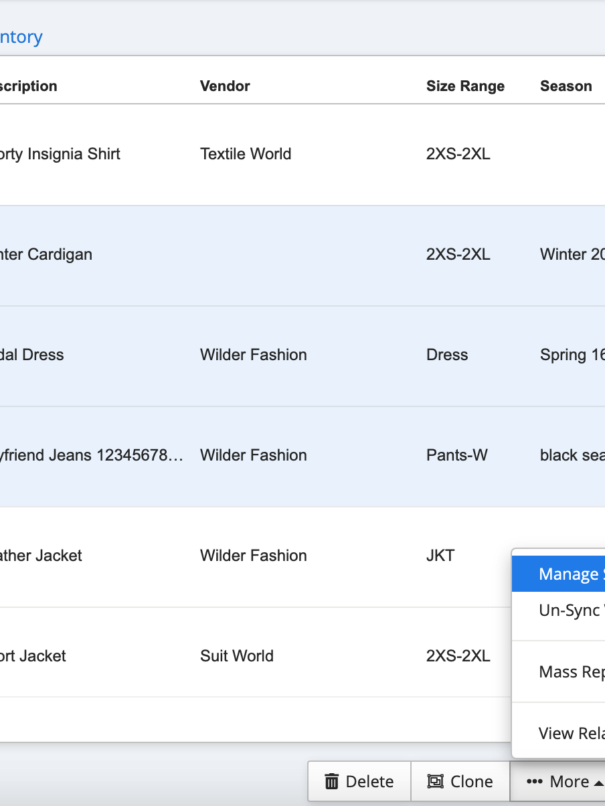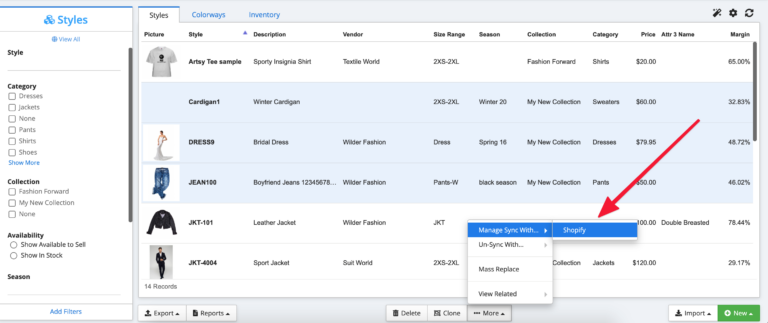Integrating an ERP with your Shopify store, or using an ERP Shopify solution, can transform your online business, but you may wonder where to start.
In this article, we will deliver a direct approach to understanding the importance of ERP Shopify integration in your operations, offering insights on how it will streamline workflows, manage resources efficiently, and set up your store for growth—all without breaking the bank.
ERP and Its Role in the Shopify Ecosystem
Think of an ERP system as the central nervous system of a business, integrating various functions into one complete, streamlined process. Essential for Shopify stores that need to juggle inventory, customer data, and countless other critical business processes, an ERP system is no longer a luxury—it’s a necessity. By centralizing data, it tears down the walls of data silos, granting real-time access to vital information and empowering decision-makers within the Shopify ecosystem.
Moreover, ERPs are the unsung heroes in the automation of data exchange, diminishing manual errors, and consolidating customer information, transforming a scattered array of data into a well-organized hub. In the fast-paced world of eCommerce, staying ahead means continuously innovating. Advanced ERP systems provide Shopify businesses with the tools they need to remain competitive, adapt swiftly to market shifts, and innovate without restraint.
The Strategic Advantage of Integrating ERP with Your Shopify Store
Imagine your Shopify store operating with the precision of a Swiss watch. That’s the strategic advantage ERP integration brings to the table. From smoothing out supply chain wrinkles to fine-tuning vendor management and securing product availability, the right ERP system can turn complex operations into a symphony of efficiency. It’s about automation, not just for the sake of technology, but to free up your focus for what truly matters—customer engagement and satisfaction.
With ERP integrations, you’re not just running a store; you’re commanding a hub of business intelligence. Real-time insights and analytics become your secret weapon, optimizing marketing strategies and fostering deep customer connections. And it doesn’t stop there. Improved internal communication, real-time access to inventory and data, and preparation for business growth are just the tip of the iceberg. Integrating ERP with Shopify gives you a competitive edge in strategic decision-making, propelling your business forward in ways you’ve only imagined.
Inventory Synchronization
The heartbeat of any eCommerce business is inventory management. Integrating an ERP system with Shopify ensures that this heartbeat is strong and regular, with real-time data synchronization keeping inventory levels and financial audits in perfect harmony. This real-time visibility isn’t just for show—it’s the cornerstone of an improved shopping experience, guaranteeing product availability and winning customer trust.
As businesses grow, the ability to manage inventory effectively becomes more critical. An ERP solution that supports real-time data sync and multi-channel sales is not just a tool—it’s your ally in navigating the complexities of an expanding operation, ensuring that over-selling is a problem of the past. When choosing an ERP, it’s about looking forward, ensuring it can handle not just today’s demands but also the growth that tomorrow brings.
Unified Customer Data
In the world of eCommerce, customer data is gold. By funneling this precious resource into a unified CRM within the ERP, businesses can refine their customer service and dial in their marketing to reach new heights of personalization. The integration of ERP with Shopify doesn’t just create personalized experiences; it deepens relationships and cements loyalty.
A 360-degree view of customer interactions paves the way for tailored marketing strategies and elevates customer support to an art form. With real-time access to customer data, decision-making becomes rapid and cohesive, aligning every touchpoint with customer needs and expectations. Breaking down data silos through ERP integrations means increased data accuracy, easy access, and insights that are not just actionable but impactful.
Streamlined Financial Operations
The financial pillar of any Shopify store stands firmer with ERP integration. Automating key tasks like invoicing and accounting, ERP systems do more than save time—they ensure that every dollar is tracked and accounted for with laser precision. Dynamic financial tracking aligns inventory management with financial resources, offering a clear picture of where the business stands at any given moment.
The automated transfer of order information, customer data, and accounting details doesn’t just reduce the manual workload—it enhances the accuracy of financial operations. This leads to streamlined financial audits and more precise reporting, which in turn strengthens the operational finances of any Shopify store. A well-integrated ERP system gives store owners a consolidated view of their financials, offering visibility and control that can be the difference between a business that survives and one that thrives.
Selecting the Ideal ERP Solution for Your Shopify Business
Selecting the right ERP solution for your Shopify business, particularly in the apparel sector, necessitates a deep dive into the specifics of each option to ensure it aligns with your business needs. Apparel Magic stands out as a strong candidate for those in the fashion industry, offering a comprehensive suite of features designed to streamline operations, from product design and development to inventory management and customer relations.
ApparelMagic is widely known for its ease of use, intuitive design, and great performance. Users have reported a smooth migration process from older systems with only minor issues. The cloud-based ERP system is valued for its comprehensive functionality and it provides a solid foundation for managing the complexities of apparel retail, including inventory forecasting, management, creating manufacturing projects, and handling sales and commissions.
Key advantages of ApparelMagic include its capabilities for multi-channel sales, multi-warehouse inventory management, integrated accounting, PLM, and CRM features. These functionalities cater well to the needs of businesses at various scales within the apparel industry. However, it’s important to be aware of some restrictions in customization, which could impact businesses requiring highly tailored software solutions.
When it comes to pricing, ApparelMagic starts at $120 per month when billed annually, offering different tiers to suit various business sizes and needs. There’s even an Ultimate plan for larger enterprises, ensuring scalability as your business grows.
Plus, the 30-day free trial allows potential users to explore the software’s capabilities before committing financially. So don’t wait, check it out and see how your apparel business grows.
The Impact of ERP on Ecommerce Customer Experiences
The true measure of an ERP system’s value is seen in the smiles of satisfied customers. Integrating ERP with Shopify offers the following benefits:
- Streamlined operations
- Quicker order fulfillment
- Potential for same-day order completions
- Elevated service levels
ERP systems offer several benefits for Shopify stores, including ERP system integration, which ensures:
- Reliable delivery commitments and order precision, are cornerstones of customer satisfaction
- Automation of repetitive tasks to minimize human errors and simplify operations
- Allowing stores to focus on delivering an exceptional customer experience that keeps shoppers coming back for more
Overcoming Common ERP Integration Challenges
The road to ERP integration is not without its bumps. From the complexity of data management to the coordination of legacy and modern SaaS platforms, challenges are part of the journey. However, with careful planning and the right strategies, such as implementing an enterprise service bus, these hurdles can be overcome, paving the way for a seamless integration that reaps long-term benefits.
Overcoming the common ERP integration challenges involves a blend of technical know-how and strategic foresight. By employing various ERP integration methods, such as API tokens, data interaction flows, and data mapping, businesses can ensure a smooth transition, maintaining data consistency and supporting critical systems like quote-to-order processes. Cloud-based solutions like an integration platform simplify the process, allowing businesses to build and deploy integrations without getting tangled in the hardware.
Data Consistency and Accuracy
Data is the lifeblood of any integrated system, and in the case of ERP, its consistency and accuracy are paramount. A well-implemented ERP system ensures that data silos are dismantled, fostering an environment where information flows freely and accurately between systems. Establishing validation rules and data governance during data migration is crucial, shielding your ERP system from the pitfalls of outdated or inaccurate data transfer.
Furthermore, an intuitive user interface in the ERP software can significantly reduce the risk of costly human errors, maintaining the integrity of your data. Accurate reporting and data traceability are also critical, granting you the ability to track data origins and quickly resolve any issues that arise, ensuring that every piece of data serves its purpose in powering your Shopify store.
Budgeting and Resource Allocation
The financial aspect of enterprise resource planning integration cannot be ignored. Budgeting and resource allocation are critical challenges, often underestimated in the early stages of adopting an enterprise resource planning system. A realistic budget must account for all expenses, from licensing fees to training and ongoing maintenance, ensuring that the project remains financially viable.
Cloud-based ERP solutions offer a ray of hope for those concerned about costs. With subscription-based models, these systems provide scalability and cost-efficiency, allowing businesses to manage their integration expenses more effectively. This approach ensures that your Shopify store gains the full benefits of ERP integration without breaking the bank.
Security and Compliance
In an era where data breaches are all too common, security and compliance are non-negotiable aspects of ERP integration. An ERP that comes equipped with robust security features such as data encryption and access control is essential to keep sensitive data safe. Advanced security features and customizable reporting tools within ERP systems not only safeguard data but also ensure compliance with stringent industry regulations.
Adhering to frequently changing and jurisdiction-specific regulations is a colossal challenge that ERPs are well-equipped to handle through automated workflows and embedded regulatory practices. However, it’s crucial to budget for necessary system customizations to meet specific compliance needs, ensuring that your Shopify business remains on the right side of the law.
Leveraging Automation Templates and Custom Integrations
The beauty of ERP systems lies in their ability to automate and optimize. By leveraging automation templates and custom integrations, Shopify stores can streamline data migration and workflow processes to achieve new levels of operational efficiency. Whether through vendor-built integrations or middleware solutions like Jitterbit, the goal is to create a seamless data flow that synchronizes every part of your business.
Integrating AI and machine learning technologies into ERP systems further enhances automation templates, providing capabilities such as AI-powered data cleansing and automated data mapping. Such advancements not only facilitate compliance with regulations but also open up opportunities for data optimization that were previously unimaginable.
Future-Proof Your Shopify Store with ERP Shopify Integration
Future-proofing your Shopify store with ERP integration is a strategic move that can set you apart from the competition. Cloud-based ERPs, in particular, offer flexibility in resource usage, ensuring that your store can scale effortlessly to meet the demands of growth. With an integrated ERP, your store gains the agility to respond quickly to market changes, thanks to centralized and real-time data access.
Global expansion and shifts in business models are challenges that an ERP-integrated Shopify store can handle with grace. This integration ensures that your operations remain smooth and uninterrupted, regardless of the scale of change. As your store grows, the automation of processes through ERP integration becomes a bulwark against human error, solidifying the foundation of your business for the long haul.
Summary
We’ve seen how ERP integration with Shopify can revolutionize your eCommerce business, from inventory and customer data management to financial operations and beyond. We’ve introduced the top ERP systems that seamlessly blend with Shopify, highlighted the enhanced customer experiences they enable, and navigated through the common challenges of integration. We’ve also explored the importance of automation and custom integrations, and discussed how ERP integration can future-proof your business.
As you stand at the threshold of this transformative journey, remember that the right ERP system can be the catalyst for unprecedented efficiency and growth in your Shopify store. Embrace the change, invest in the future, and watch as your business reaches new heights of success.







